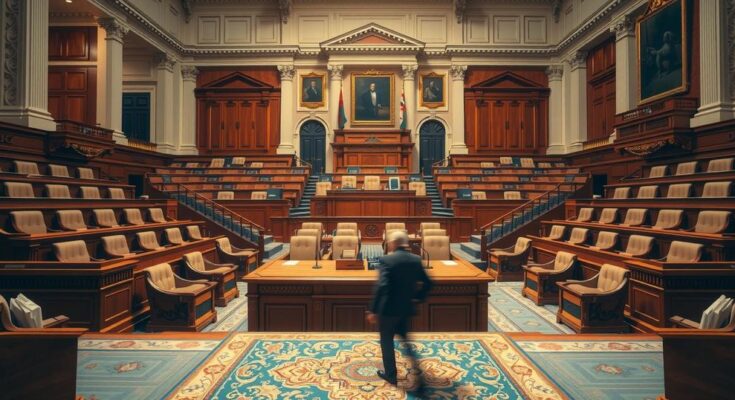Nigerian lawmakers approved President Bola Tinubu’s State of Emergency in Rivers State via voice votes, violating constitutional requirements for a two-thirds majority. Public concerns regarding transparency were disregarded as the parliament followed the voice voting approach without proper debate. This decision has raised questions about the legitimacy of the emergency rule during politically tumultuous times in Rivers State.
The Nigerian parliament recently approved President Bola Tinubu’s declaration of a State of Emergency in Rivers State. This decision was made via voice votes in both chambers, despite constitutional requirements mandating a two-thirds majority voting process for such declarations, as outlined in Section 305 (6b) of the Nigerian constitution.
Many citizens anticipated that lawmakers in the Senate and House of Representatives would adhere to proper voting protocols to ensure transparency regarding the actual support for the president’s declaration. Concerns were expressed notably by banker Atedo Peterside, who emphasized that a two-thirds majority cannot be accurately determined through voice voting.
Activist Dele Farotimi echoed similar sentiments, insisting that the Senate must conduct a counted vote to verify that constitutional requirements were fulfilled. Despite these calls for accountability, both chambers ultimately proceeded with voice votes and declared the necessary majority was reached, disregarding the expressed concerns of the public.
During a closed-door session lasting about 80 minutes, the Senate conducted its voice vote without public debate or opposition being recorded. With 109 members in the Senate and 360 in the House, the lack of a full and visible voting process has raised further questions about the legitimacy of the emergency declaration.
The State of Emergency was imposed in response to escalating political tensions in Rivers State between Governor Siminalayi Fubara and his predecessor Nyesom Wike, with the president asserting that the situation was hindering governance. As part of this emergency action, President Tinubu suspended Governor Fubara, his deputy, and all state legislature members for six months.
For continued integrity in news reporting, Premium Times advocates for accessible journalism. They emphasize their commitment to providing high-quality, fact-checked news regardless of the reader’s ability to pay, thus promoting informed public discourse.
In conclusion, the approval of the State of Emergency in Rivers State by voice votes raises significant concerns regarding adherence to constitutional voting requirements. Despite public calls for a transparent process, the parliament opted for a less accountable method, undermining the legitimacy of the decision. This situation highlights the ongoing political challenges in Nigeria and the critical importance of transparent governance. Furthermore, the suspension of key state officials during this crisis may impact state operations and governance significantly. The commitment of Premium Times to deliver accessible news is a vital aspect of fostering informed public awareness in such crucial matters.
Original Source: www.premiumtimesng.com




